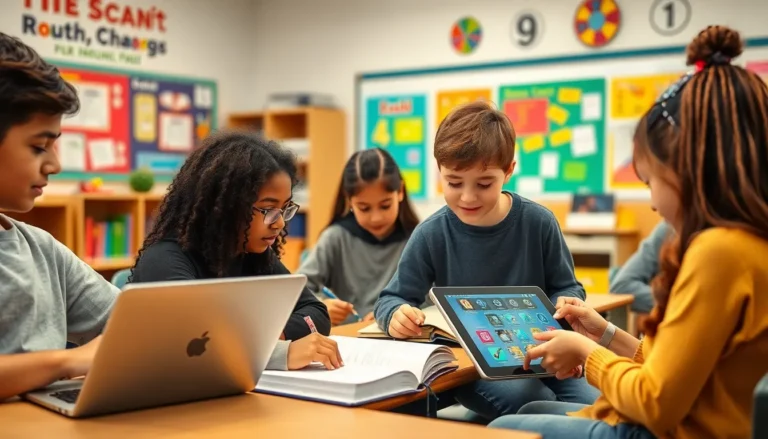In a world where school drop-offs can feel like a scene from a high-speed chase, homeschooling emerges as the calm in the chaos. Imagine trading in the morning traffic for cozy breakfast chats and spontaneous field trips to the local zoo. It’s not just about avoiding the carpool line; it’s about crafting a personalized learning adventure that fits your child’s unique style.
Table of Contents
ToggleUnderstanding Homeschooling
Homeschooling offers a flexible and personalized alternative to traditional education. Families often create an environment that fosters unique learning experiences tailored to a child’s interests and needs.
Definition and Concept
Homeschooling refers to the practice of educating children at home rather than sending them to a public or private school. This educational model allows parents to design a curriculum that aligns with their child’s learning style. Focused on individualized instruction, homeschooling can include various methods, such as online courses, structured lessons, or experiential learning opportunities. Many families appreciate the freedom to incorporate life experiences into the learning process. This style often enhances engagement and retention, as children explore subjects that resonate with their personal interests.
History of Homeschooling
Homeschooling dates back to ancient civilizations, where education often occurred within the home. Early American education primarily revolved around informal homeschooling practices before formal schools became widespread in the 19th century. During the mid-20th century, a renewed interest in homeschooling emerged, largely influenced by educational reformers and cultural movements. The acceptance of homeschooling grew, and legal recognition followed. By the 1980s and 1990s, homeschooling significantly expanded, fueled by the desire for personalized education. Legislation across numerous states now supports this educational choice, recognizing parental rights to educate their children at home.
Benefits of Homeschooling
Homeschooling offers numerous benefits, particularly when considering customized learning experiences and flexible schedules. These aspects cater to individual needs and preferences, creating a unique educational journey.
Customized Learning Experience
Customizing education empowers parents to tailor lessons that align with their child’s interests and learning styles. Individualized approaches increase engagement and foster a love for learning. Parents can design curriculums that incorporate hands-on projects, diverse resources, and real-world applications. The flexibility allows students to explore topics in depth and retain information more effectively. Personalized learning often leads to higher academic achievement, as children learn at their own pace. This approach promotes confidence, enhances critical thinking skills, and nurtures creativity.
Flexible Schedule
Flexible schedules enhance the homeschooling experience, enabling families to prioritize learning without time constraints. Days can be structured around personal commitments and optimal learning times, accommodating various activities or interests. Unconventional hours facilitate spontaneous learning outings, such as field trips or nature explorations. This flexibility supports a harmonious balance between education and family life. Families can adapt learning styles to suit each child’s rhythm, allowing for focused study or leisurely exploration. Time management skills are developed, preparing children for future responsibilities.
Challenges of Homeschooling
Homeschooling presents various challenges, despite its many benefits. Addressing these concerns is vital for families considering this educational path.
Socialization Concerns
Socialization poses significant concerns for homeschoolers. Many parents worry their children miss out on social interactions found in traditional schools. Participating in activities with peers helps develop social skills, yet homeschoolers can also seek community through local groups or co-ops. These options create opportunities for children to connect with others. Engaging in extracurricular activities provides further avenues for socialization. Sports teams, dance classes, and art workshops can offer critical interactions with peers. Establishing connections with other homeschool families ensures a balanced social life.
Time Management Issues
Time management issues arise for many homeschooling families. Parents guide their children’s education, which may lead to challenges in balancing teaching and personal responsibilities. Establishing a structured schedule helps focus learning sessions and family activities. Flexibility can be both an advantage and disadvantage in homeschooling. While it allows adaptations for family needs, it may also result in chaotic routines. Setting priorities helps maintain a sense of order. Families can define clear goals for each homeschooling session, streamlining lessons and preventing burnout. Creating daily and weekly plans fosters accountability.
Popular Homeschooling Methods
Different methods exist to approach homeschooling, catering to diverse learning styles and family preferences. Two notable methods include Classical Education and Unschooling.
Classical Education
Classical Education emphasizes a structured approach to learning through three stages: grammar, logic, and rhetoric. The grammar stage focuses on foundational knowledge, where students memorize facts and concepts. Next, the logic stage encourages critical thinking and reasoning by exploring relationships between ideas. Finally, the rhetoric stage nurtures effective communication, allowing students to express their thoughts confidently. This method often utilizes classical texts and integrated subjects to foster a comprehensive understanding. Parents appreciate this method for its emphasis on cultivating disciplined thinkers who engage deeply with material.
Unschooling
Unschooling rejects traditional curriculum structures and prioritizes learning driven by a child’s interests. Each child’s unique passions guide the educational journey. This method values curiosity and promotes self-directed exploration. Parents act as facilitators, providing resources and support rather than predefined lessons. Unschooling can lead to diverse experiences, as children learn from real-world situations, community engagement, and personal interests. The flexibility in this approach often results in a love of learning, as children discover knowledge through their intrinsic motivation. Families enjoy the vibrant educational experiences that come with this method, often leading to holistic development.
Resources for Homeschooling Families
Homeschooling families have access to various resources that enhance their educational experience. These resources include online platforms, tools, and community support groups, each providing unique benefits.
Online Platforms and Tools
Numerous online platforms offer courses, lesson plans, and educational materials tailored for homeschooling families. Websites like Khan Academy and Coursera provide free access to a wide range of subjects, promoting self-paced learning. Learning management systems, such as Google Classroom, streamline lesson organization and communication between parents and children. Educational apps also support learning through interactive exercises and games, making study sessions engaging and fun.
Community Support Groups
Local and online community support groups play a crucial role in connecting homeschooling families. Engaging with groups on platforms like Facebook and Meetup provides access to resources, co-ops, and shared experiences. These groups often organize educational outings, workshops, and social events, addressing common concerns about socialization. Networking with fellow homeschoolers fosters a sense of belonging and enriches the homeschooling journey, as families share resources and encouragement.
Homeschooling offers a unique approach to education that prioritizes the individual needs of children. By allowing families to customize learning experiences and schedules, it fosters a love for learning and encourages personal growth. While challenges like socialization and time management exist, they can be effectively addressed through community engagement and structured planning.
With various methods and resources available, families can create an enriching educational environment that aligns with their values and aspirations. Ultimately, the choice to homeschool can lead to meaningful educational journeys that prepare children for a successful future.


